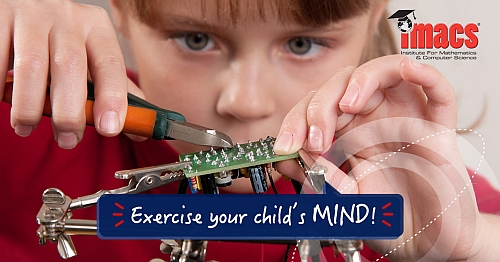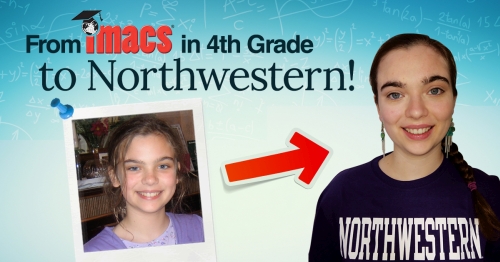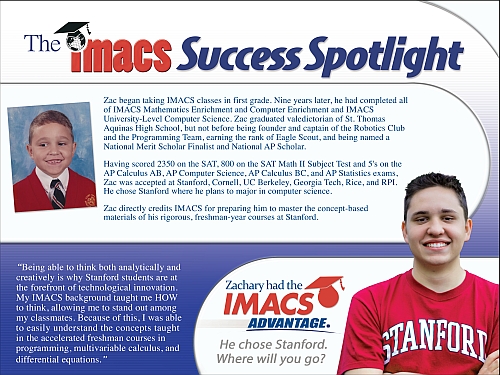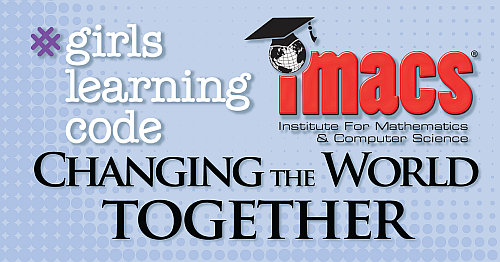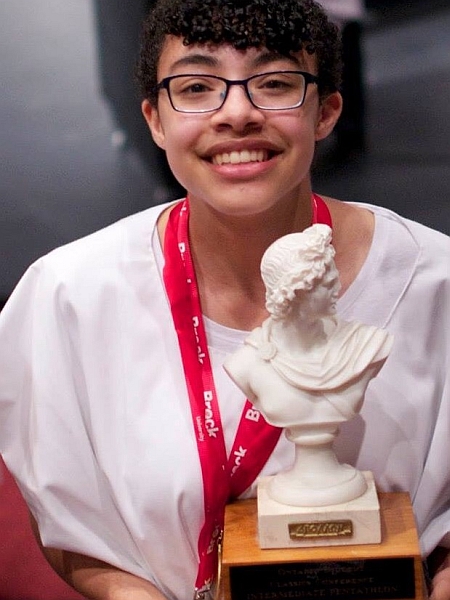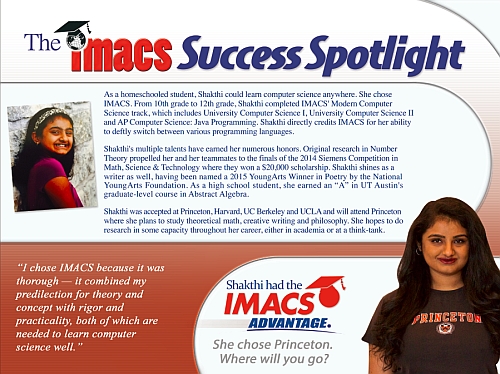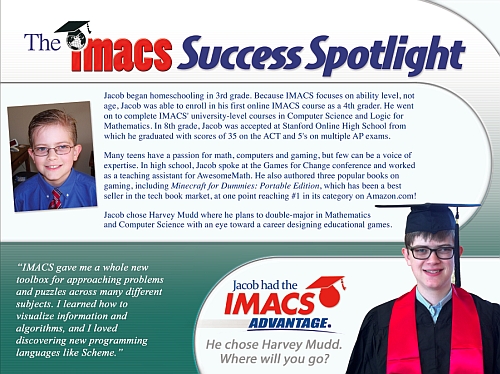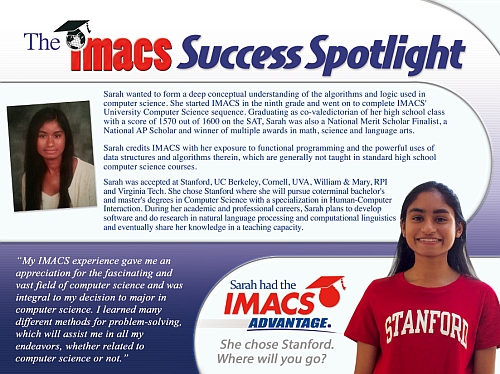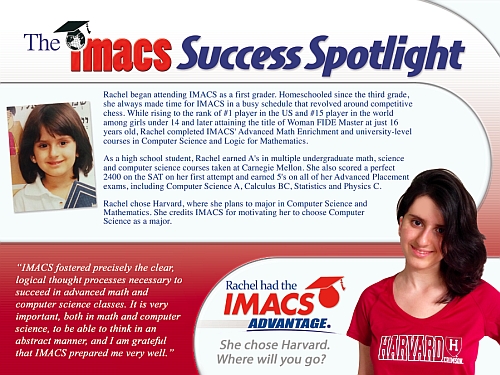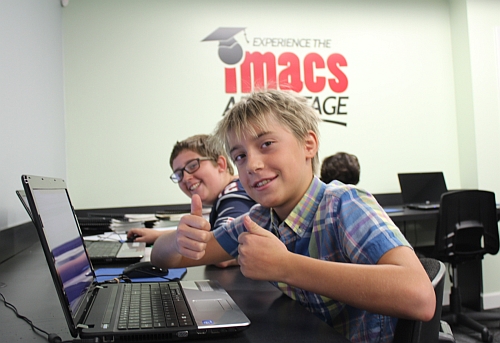
The Institute for Mathematics and Computer Science (IMACS) believes in making sure kids exercise their minds this summer, in addition to their bodies, with fun yet educational summer camp experiences. Spending summers having fun and being outside is definitely important, but a small dose of educational summer camp is essential for all students too. Here are three reasons why:
1. Retain Knowledge: Summer vacation can often lead to forgetfulness and overall loss of learning. According to a study by the RAND Corporation, students lose, on average, one month of learning during the summer, all students lose some learning in math, and summer learning loss is cumulative over time. When kids aren't working certain parts of their brains during summer, they end up spending the first few weeks of the academic year refreshing what was lost. Educational summer camp activities keep those areas of the brain active so that children are ready to engage in new learning when school begins again.
2. Develop New Interests: Educational summer camps are a great way to explore new academic areas that kids don't have time for during the year because of school commitments and extracurricular activities. IMACS Hi-Tech Summer Camp, for example, often sparks the interest of kids who never considered math, electronics or virtual robotics as something they would enjoy. This is especially true for girls who often don't get enough exposure to these kinds of activities. At IMACS, we have had a number of students realize they want to study engineering after being immersed in hands-on projects and the logical and creative ways engineers think at our Hi-Tech Summer Camp.
3. Make New Friends: If your child enjoys fun, academic challenges in mathematics, computer programming and gaming already, they will not only have the opportunity to advance their skills, they will meet other kids their age with similar interests. Educational summer camp attendees are smart, fun, and enjoy a little friendly competition. It's a truly unique opportunity for your child to connect with other kids who appreciate their unique way of thinking. It's also a time for kids to be inspired by instructors who are genuinely passionate about their field.
Educational summer camp should be a part of every child's summer activities. It helps stop summer "brain drain", exposes kids to new ideas and pursuits, and leads to great friendships and memories. When choosing an educational summer camp, be sure to ask if the camp is staffed by high school and college kids or by highly-qualified and experienced instructors. After all, these kinds of camps should involve real thinking in addition to real fun!
beginning her studies at Northwestern University.
Fiona first attended IMACS Hi-Tech Summer Camp when she was ten. Over the next eight years, she went on to complete IMACS’ university-level courses in University Computer Science, AP Computer Science: Java Programming, and Logic for Mathematics. Homeschooled since fifth grade, Fiona was awarded a National Merit Scholarship, named an AP Scholar with Distinction, and scored 2360 on the SAT. She is also a second degree black belt in Taekwondo and won a bronze medal at the 2013 AAU Junior Olympic Games.
As a high school student, Fiona studied four years of undergraduate, advanced undergraduate, and graduate classes in mathematics and physics at Northwestern University where she is the only student to have won the Outstanding Achievement in Advanced Mathematics Classes by a High School Student prize four years in a row. During that time, Fiona also served as a Teaching Assistant for the University of Chicago’s Young Scholars Program, a position usually reserved for undergraduates.
Fiona chose Northwestern, where she intends to major in Mathematics and Physics. She plans to pursue a career as a university professor of mathematics. Fiona directly credits IMACS for helping her to develop a deeper appreciation for and a sense of ownership of the mathematics that she learns.
“Logic and computer programming classes at IMACS taught me how to organize my thinking and break problems into solvable pieces. The natural structure of logic and computer programming allowed me to see the structure of a mathematical proof as I was writing or reading it. When I understand it at that level, I feel I can reconstruct it and use it creatively as well.”
who is beginning his sophomore year at Stanford.
Zac began taking IMACS classes in first grade. Nine years later, he had completed all of IMACS Mathematics Enrichment and Computer Enrichment and IMACS University-Level Computer Science. Zac graduated valedictorian of St. Thomas Aquinas High School, but not before being founder and captain of the Robotics Club and the Programming Team, earning the rank of Eagle Scout, and being named a National Merit Scholar Finalist and National AP Scholar.
Having scored 2350 on the SAT, 800 on the SAT Math II Subject Test and 5’s on the AP Calculus AB, AP Computer Science, AP Calculus BC, and AP Statistics exams, Zac was accepted at Stanford, Cornell, UC Berkeley, Georgia Tech, Rice, and RPI. He chose Stanford where he plans to major in computer science.
Zac directly credits IMACS for preparing him to master the concept-based materials of his rigorous, freshman-year courses at Stanford.
“Being able to think both analytically and creatively is why Stanford students are at the forefront of technological innovation. My IMACS background taught me HOW to think, allowing me to stand out among my classmates. Because of this, I was able to easily understand the concepts taught in the accelerated freshman courses in programming, multivariable calculus, and differential equations.”
Ladies Learning Code and the Institute for Mathematics and Computer Science (IMACS) are partnering to award over $3,000 in scholarships to participants in the 2016 Girls Learning Code Camps and members of GLC’s Teen:Club. The two full and three half scholarships will allow recipients to enroll in IMACS’ introductory computer science course, University Computer Science I (UCS1).
240 girls ages nine to twelve are expected to attend Girls Learning Code Camps in Toronto this March and Summer. The camps are designed to help girls see technology in a whole new light — as a medium for self-expression, and as a means for changing the world. IMACS will award one full scholarship and one half scholarship among applicants who attend the camps. All campers are invited to apply.
Shuli Jones attended the very first Girls Learning Code camp as a 6th grader back in 2012 where she won a half scholarship to UCS1. She is now a sophomore in high school and recently scored a ‘5’ on the AP Computer Science A exam as a freshman. Since starting IMACS’ computer science courses soon after the camp, Shuli has been one of IMACS’ top CS students.
IMACS will award the other full scholarship and two half scholarships to members of GLC’s Teen:Club. In Teen:Club, 13 to 17 year old girls focus on solving problems, turning ideas into reality and learning about what a future in technology could look like. All members are invited to apply.
"Now that we have been running youth programs for 4 years, we are really starting to see our participants move on to technical career paths, pursuing Computer Science in University and coming back to participate in our programs as mentors, inspiring the next generation of girls," says Laura Plant of Ladies Learning Code. "We’re excited for our girls to have an opportunity to study computer science at a high level with IMACS."
"IMACS believes in the potential of bright girls and young women to shape a better future for all people," adds IMACS president Terry Kaufman. "We are thrilled to be working with Ladies Learning Code again to encourage more girls to pursue computer science in college and in their careers."
Scholarship Information
The course, UCS1, is a challenging and engaging introductory programming course that gives students the tools they need to excel as a computer science major in college. UCS1 teaches the fundamental principles of computer science at the university level but was developed for talented middle and high school students.
Scholarship applicants must submit a 100-250 word essay to Ladies Learning Code on what they hope to get out of this program. They are also required to pass the online eIMACS Aptitude Test. The application deadline for these scholarships is August 31st 2016.
Applicants may register for the eIMACS Aptitude Test at www.eimacs.com/aptitude. On the online registration form, enter "Girls Learning Code 2016" in the box for "How did you hear about IMACS?"
About Ladies Learning Code
Ladies Learning Code is a Canada-wide not-for-profit organization that runs workshops for women and youth who want to learn beginner-friendly computer programming and other technical skills in a social and collaborative way. Today they have 22 chapters (and counting) across Canada, a thriving girls’ program called Girls Learning Code and co-ed kids program called Kids Learning Code. With sponsors and community partners that include TELUS, Microsoft, Facebook, Autodesk, Google and many more, Ladies Learning Code has become synonymous with technology education in Canada.
About IMACS
Founded in 1993 by a team of mathematicians, computer scientists and educators, IMACS offers talented middle and high school students a range of online courses in university-level mathematics and computer science that are recognized by many prestigious universities. IMACS also offers math and computer enrichment classes at its US centers in Florida, North Carolina, Missouri, and Connecticut. Over 4,500 students throughout the US and the world attend local IMACS classes or study its online courses. For more information on IMACS visit www.imacs.org.
Contact
For Ladies Learning Code:
Laura Plant, Co-Executive Director
laura@ladieslearningcode.com
416-579-9809
For IMACS:
Natasha Chen, Communications Director
nchen@imacs.org
954-791-2333
as she holds the trophy for winning the Intermediate Pentathlon prize
at this year’s Ontario Student Classics Conference.
This week, the IMACS Blog visits with eIMACS student Shuli Jones. Shuli is one of our star students, having excelled in our university-level computer science courses since the 6th grade. She recently attained the highest score possible on the AP Computer Science A test exam as a high school freshman. A multitalented young lady with a passion for programming, Shuli is well on her way to a bright future.
Please tell our readers a little bit about yourself and what you enjoy doing.
My name is Shuli Jones. I’m fifteen years old, and I’m currently a sophomore in high school. In my spare time, I like to participate in a variety of activities: I love to read, I do archery recreationally, I’m part of a trivia team and a classics society at my school, and, of course, I love programming. I’m also interested in learning new languages, coding and otherwise!
You’ve done some amazing things already at a young age. Tell us about the accomplishments and experiences of which you are most proud.
In recent memory, the thing I am the most proud of is scoring a 5 on the AP Computer Science A test. I took it while still a freshman, so it was my first AP test and I was very nervous beforehand. However, eIMACS had prepared me unbelievably well, and that, combined with my own hard studying, meant the test was nowhere near as hard as I expected. When the results came in, both my parents and I were really pleased.
Something else I’m proud of is my performance in my school’s classics society. Every year in May, we participate in the Ontario Student Classics Conference. This is a three-day competition with numerous other schools that tests knowledge of Latin grammar and vocabulary, as well as Roman life, mythology, and history. For me, this was my biggest commitment during the school year, and it’s something that I love to do. I put in many, many hours of hard work studying and working on projects with my team members, and it paid off.
My team won the Phyllis Morgan Trophy for Overall Excellence, which is typically regarded as the "top" trophy at the conference. I won several individual awards in the Intermediate category (for those having taken two years of Latin): First in Pentathlon, for having the best overall score on the five main events (notably with a first in Latin Derivatives), and first in Latin Oral Reading. I was also part of a group of four students who came second in Quaerite Summa ("Reach for the Top"), which is a quiz-bowl style competition based solely on Roman life. It felt great to get recognition for my work on something I love so much.
How did you become interested in computer science?
When I was in sixth grade, I spent Spring Break at a Girls Learning Code camp. They had partnered with eIMACS to give away a scholarship for the first eIMACS programming course, University Computer Science I. To apply for the scholarship, I took the eIMACS Aptitude Test. The test was interesting and challenging, so my parents said they would sign me up for the course. From there, my interest only increased. I’ve taken three eIMACS courses now, and each one has introduced me to new programming languages, topics, and ideas.
What do you enjoy most about the eIMACS computer science courses?
I have to say, the thing that appeals to me the most about these courses is their rigor. I can tell a lot of care was put into creating them: the information is always laid out in a logical sequence, and the learning curve is perfect. Assignments are usually just the right difficulty level to leave me challenged but not frustrated. At the same time, the programming that I’m learning is very in-depth; I feel that I’m being prepared very well to succeed in the rest of the coding world. I especially liked the variety of languages that eIMACS introduced me to (Scheme, Haskell, Python and Java), as well as the focus on "good" programming and not just on getting things done.
What are some ways in which your eIMACS experience has had a positive effect on your academic and non-academic pursuits?
Completely thanks to the knowledge I gained from my eIMACS courses, this past summer I was offered my very first paid programming internship. It was a great opportunity to learn more about the outside world of programming (and the endless debugging that real coders must carry out!). The courses I’ve taken through eIMACS have also greatly increased my capacity for logical analysis and thought; I often find myself applying the programming principles I’ve learned to my schoolwork and assignments. Additionally, eIMACS has had a positive effect on my life overall. I’ve been participating in their courses for three years now, and they have broadened my mind and introduced me to new things I might never have experienced otherwise. I’m so happy that I chose to learn computer science through eIMACS.
What kinds of things do you see yourself doing in the future?
I’m not sure yet. I know that I want to work in a STEM field, and right now my thinking is that I’d like to do something with engineering — perhaps be a mechanical engineer? I want my job to be something that lets me create new things and leave my mark on the world. Whatever that may be, I know eIMACS has helped to prepare me by giving me a solid grounding in programming and logical thought.
As a homeschooled student, Shakthi could learn computer science anywhere. She chose IMACS. From 10th grade to 12th grade, Shakthi completed IMACS’ Modern Computer Science track, which includes University Computer Science I, University Computer Science II and AP Computer Science: Java Programming. Shakthi directly credits IMACS for her ability to deftly switch between various programming languages.
Shakthi’s multiple talents have earned her numerous honors. Original research in Number Theory propelled her and her teammates to the finals of the 2014 Siemens Competition in Math, Science & Technology where they won a $20,000 scholarship. Shakthi shines as a writer as well, having been named a 2015 YoungArts Winner in Poetry by the National YoungArts Foundation. As a high school student, she earned an "A" in UT Austin’s graduate-level course in Abstract Algebra.
Shakthi was accepted at Princeton, Harvard, UC Berkeley and UCLA and will attend Princeton where she plans to study theoretical math, creative writing and philosophy. She hopes to do research in some capacity throughout her career, either in academia or in a think-tank.
“I chose IMACS because it was thorough — it combined my predilection for theory and concept with rigor and practicality, both of which are needed to learn computer science well.”
Jacob began homeschooling in 3rd grade. Because IMACS focuses on ability level, not age, Jacob was able to enroll in his first online IMACS course as a 4th grader. He went on to complete IMACS’ university-level courses in Computer Science and Logic for Mathematics. In 8th grade, Jacob was accepted at Stanford Online High School from which he graduated with scores of 35 on the ACT and 5’s on multiple AP exams.
Many teens have a passion for math, computers and gaming, but few can be a voice of expertise. In high school, Jacob spoke at the Games for Change conference and worked as a teaching assistant for AwesomeMath. He also authored three popular books on gaming, including Minecraft for Dummies: Portable Edition, which has been a best seller in the tech book market, at one point reaching #1 in its category on Amazon.com!
Jacob chose Harvey Mudd where he plans to double-major in Mathematics and Computer Science with an eye toward a career designing educational games.
“IMACS gave me a whole new toolbox for approaching problems and puzzles across many different subjects. I learned how to visualize information and algorithms, and I loved discovering new programming languages like Scheme.”
Sarah wanted to form a deep conceptual understanding of the algorithms and logic used in computer science. She started IMACS in the ninth grade and went on to complete IMACS’ University Computer Science sequence. Graduating as co-valedictorian of her high school class with a score of 1570 out of 1600 on the SAT, Sarah was also a National Merit Scholar Finalist, a National AP Scholar and winner of multiple awards in math, science and language arts.
Sarah credits IMACS with her exposure to functional programming and the powerful uses of data structures and algorithms therein, which are generally not taught in standard high school computer science courses.
Sarah was accepted at Stanford, UC Berkeley, Cornell, UVA, William & Mary, RPI and Virginia Tech. She chose Stanford where she will pursue coterminal bachelor’s and master’s degrees in Computer Science with a specialization in Human-Computer Interaction. During her academic and professional careers, Sarah plans to develop software and do research in natural language processing and computational linguistics and eventually share her knowledge in a teaching capacity.
“My IMACS experience gave me an appreciation for the fascinating and vast field of computer science and was integral to my decision to major in computer science. I learned many different methods for problem-solving, which will assist me in all my endeavors whether related to computer science or not.”
Rachel began attending IMACS as a first grader. Homeschooled since third grade, she has always made time for IMACS in a busy schedule that revolved around competitive chess. While rising to the rank of #1 player in the US and #15 player in the world among girls under 14 and later attaining the title of Woman FIDE Master at just 16 years old, Rachel completed IMACS’ Advanced Math Enrichment and university-level courses in Computer Science and Logic for Mathematics.
As a high school student, Rachel earned A’s in multiple undergraduate math, science and computer science courses taken at Carnegie Mellon. She also scored a perfect 2400 on the SAT on her first attempt and earned 5’s on all of her Advanced Placement exams, including Computer Science A, Calculus BC, Statistics and Physics C.
Rachel chose Harvard, where she plans to major in Computer Science and Mathematics. She credits IMACS for motivating her to choose Computer Science as a major.
“IMACS fostered precisely the clear, logical thought processes necessary to succeed in advanced math and computer science classes. It is very important, both in math and computer science, to be able to think in an abstract manner, and I am grateful that IMACS prepared me very well.”
Related Blog Posts:
The "learn to code" movement has emphasized teaching computer programming to children, and so many parents are asking, "Which language should my child learn?" It’s easy to be overwhelmed by the myriad choices: Java, Python, Ruby, C++, Objective-C, and so on. Ten years ago, the list of languages would have been different, but the question would still have been the same. So instead of focusing on learning a particular language that is popular at the moment and wondering if it’s the "right" choice, consider that your child would benefit most from learning the fundamental concepts in computer science that are applicable across all programming languages. Understanding these foundational ideas well enables a person to problem-solve in any programming environment more effectively than knowing the rules of syntax for one particular language. It’s a lot like the craft of photography. If you’ve mastered the fundamentals — composition, lighting, exposure, etc. — then you’re in a much better position to take memorable photographs regardless of whether you’re handed a Canon, an iPhone, or a disposable camera. The same is true in computer science where computational thinking and the ability to learn are and always will be more highly valued than code manipulation. Besides, by the time your child is a working professional, it’s likely that a different set of languages, some not yet invented, will be in vogue. Wouldn’t it be better for him or her to have a timeless set of skills and abilities?
« Newer Posts — Older Posts »







